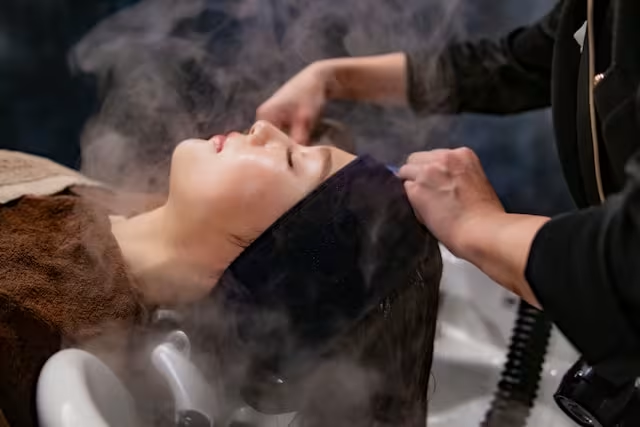High Intensity Focused Ultrasound (HIFU) treatments have gained significant popularity in recent years, particularly in Singapore and across many cosmetic markets worldwide.
With promises of facial lifting, wrinkle reduction, and skin tightening without surgery, it’s no wonder that HIFU has become a sought-after procedure.
Related: The Ultimate Guide to HIFU Treatment in Singapore
However, as these treatments become increasingly available at beauty salons and non-medical establishments, many potential patients are left wondering: do HIFU treatments at beauty salons really work, and how do they compare to those performed in medical clinics?
Understanding HIFU: What Is It?
High Intensity Focused Ultrasound is a non-invasive therapeutic technique that utilizes an energy-based device to improve facial creases and skin laxity.
The procedure works by directing concentrated ultrasonic energy into specific tissue layers beneath the skin’s surface. These non-ionizing ultrasonic waves generate heat when they interact with the targeted tissues, which can:
- Stimulate collagen production
- Tighten loose skin
- Reduce the appearance of fine lines and wrinkles
- Create a lifting effect similar to what might be achieved with surgical procedures
Beyond cosmetic applications, HIFU technology has various medical uses, including cancer treatment, tumor reduction, and addressing certain diseases through its precise energy delivery capabilities.
One of the most appealing aspects of HIFU treatments is that they require no downtime. Patients can typically resume their normal activities immediately after the procedure while still achieving results comparable to more invasive options.
HIFU in Medical Clinics vs. Beauty Salons
Medical-Grade HIFU Treatments
HIFU devices used in registered medical clinics are subject to stringent regulations and must meet specific standards:
- They are medical-grade devices capable of delivering higher energy levels
- They require approval from health authorities (such as HSA in Singapore)
- They can only be legally operated by qualified medical doctors
- They often incorporate advanced safety features and monitoring capabilities
Read more: Ultherapy Cost in Singapore: Is It Right For Me? (Updated)
The most widely recognized medical-grade HIFU devices in Singapore include Ulthera and Ultraformer III. These devices have established clinical evidence supporting their safety and efficacy when used by trained medical professionals.
Medical clinics offering HIFU treatments typically:
- Have licensed medical professionals (ie aesthetic doctors) performing or supervising the treatments
- Use devices that can deliver precisely calibrated energy to achieve optimal results
- Follow strict protocols to ensure patient safety
- Can offer personalized treatment plans based on individual skin conditions
- Are equipped to manage any potential complications that might arise
HIFU Treatments at Beauty Salons
HIFU treatments provided by beauty salons present a different scenario:
- Devices used may not be medical-grade and might have limited capabilities
- They generally cannot deliver the same high energy levels as medical-grade devices
- Operators may have varied levels of training and experience
- The regulatory oversight is typically less rigorous
The effectiveness of HIFU treatments in beauty salons largely depends on:
- The quality and capabilities of the device being used
- The training and expertise of the operator
- The specific skin concerns being addressed
- The number of treatment sessions provided
Because beauty salon HIFU devices often deliver lower energy levels, patients might require multiple treatment sessions to achieve noticeable results, and even then, the outcomes may be minimal or temporary compared to medical-grade treatments.
The “Therapeutic Window” of HIFU Treatments
A critical concept in understanding HIFU effectiveness is the “therapeutic window” or “sweet spot” of energy delivery.
This refers to the optimal range of energy levels that produce desired results without causing harm:
- Energy levels below the therapeutic window: Results may be minimal or non-existent, as insufficient energy fails to create the thermal effect needed to stimulate collagen production and tissue tightening.
- Energy levels within the therapeutic window: Optimal results with effective collagen stimulation and tissue tightening without damage.
- Energy levels above the therapeutic window: Risk of burns, pain, and damage to underlying skin structures including nerves, blood vessels, and other tissues.
Medical-grade HIFU devices are designed to consistently deliver energy within this therapeutic window when operated by trained professionals. Non-medical grade devices may struggle to reach the lower threshold of the therapeutic window or may lack the precise control mechanisms needed to prevent exceeding the upper threshold.
The Ulthera Advantage: Live Scanning Capability
Among HIFU devices available in Singapore, Ulthera stands out for its unique “live scanning” feature. This capability:
- Provides real-time visualization of skin depth and underlying structures
- Allows doctors to see blood vessels, nerves, and bones beneath the treatment area
- Enables practitioners to avoid vital structures during the procedure
- Ensures proper coupling of the handpiece to the skin for optimal energy delivery
Due to its advanced capabilities, Ulthera is restricted to registered medical clinics and doctors who hold the appropriate licensing (N2 NEA license in Singapore). This restriction highlights the sophisticated nature of the technology and the importance of proper training for its safe and effective use.
Choosing Between Medical Clinics and Beauty Salons for HIFU
When deciding where to receive HIFU treatments, consider these factors:
Advantages of Medical Clinics:
- Access to medical-grade devices with proven efficacy
- Treatment by qualified medical professionals
- Comprehensive assessment of your skin condition
- Ability to address potential complications
- More predictable and potentially longer-lasting results
- Advanced features like live scanning (with Ulthera)
Considerations for Beauty Salons:
- Generally more affordable pricing
- May be suitable for maintenance treatments after medical treatments
- Could provide mild improvements for minor skin concerns
- Potentially less discomfort due to lower energy delivery
- More accessible locations and availability
Potential Risks and Complications
All energy-based treatments carry some risk, and HIFU is no exception. Potential complications include:
- Temporary redness, swelling, or tenderness
- Mild bruising
- Temporary numbness or tingling
- Rare but possible burns if energy delivery is too high
- Nerve damage in very rare cases
The risk of complications is generally higher when treatments are performed:
- Using devices without proper calibration
- By operators with insufficient training
- Without proper assessment of the patient’s skin condition
- Without the ability to visualize underlying structures
Maximizing Your HIFU Results
Regardless of where you choose to have your HIFU treatment, these tips can help maximize your results:
- Maintain realistic expectations about what HIFU can achieve
- Follow all pre and post-treatment care instructions
- Stay hydrated before and after your treatment
- Protect your skin from sun exposure following treatment
- Consider combining HIFU with complementary treatments for enhanced results
- Follow the recommended treatment schedule if multiple sessions are advised
The Bottom Line: Do Beauty Salon HIFU Treatments Work?
The effectiveness of HIFU treatments at beauty salons can vary significantly. While some may provide modest improvements, particularly for minor skin concerns or as maintenance treatments, they generally cannot match the results achieved with medical-grade devices operated by qualified professionals.
Beauty salon HIFU treatments may work to some degree if:
- The salon uses quality equipment that meets minimum energy thresholds
- The operator is well-trained and experienced
- Your skin concerns are relatively minor
- You undergo multiple treatment sessions as recommended
- You have realistic expectations about the results
However, for significant skin laxity, deeper wrinkles, or more dramatic lifting effects, medical-grade HIFU treatments performed in a clinical setting are likely to provide more consistent and satisfactory results.
Conclusion
HIFU can be an effective non-invasive procedure for facial lifting and skin tightening when performed properly with appropriate equipment. While beauty salon treatments may offer more accessible and affordable options, the results are often less predictable and potentially less dramatic than those achieved in medical settings.
Before committing to any HIFU treatment, it’s advisable to research the specific device being used, inquire about the operator’s training and experience, and consult with experienced professionals to determine the most appropriate approach for your individual skin concerns and goals.
Remember that effective skin rejuvenation often involves a comprehensive approach that may include multiple modalities, proper skincare, and lifestyle factors beyond any single treatment.
Frequently Asked Questions About HIFU Treatments
How long do HIFU results last?
HIFU results typically last between 12-18 months when performed with medical-grade devices. Results from beauty salon treatments may last 6-12 months, depending on the device used, your skin condition, and how many treatments you receive. As with any non-surgical treatment, individual results vary, and maintenance sessions are usually recommended to sustain the effects.
Is HIFU painful?
Most patients experience some discomfort during HIFU treatments. Medical-grade devices operating at higher energy levels typically cause more sensation, described as brief pulses of heat or tingling. Beauty salon devices generally operate at lower energy levels and may cause less discomfort, but this may also correlate with reduced effectiveness.
How many HIFU sessions are needed?
In medical settings, a single HIFU session with a high-quality device may be sufficient to see noticeable results, with optimal improvements developing over 2-3 months. Beauty salon treatments often require multiple sessions (3-6) spaced several weeks apart to achieve comparable results due to the lower energy output of non-medical grade devices.
Is there any downtime after HIFU?
One of the major advantages of HIFU is minimal to no downtime. Most patients can return to normal activities immediately after treatment. Some may experience mild redness, swelling, or tenderness that typically resolves within a few hours to days. These effects are generally less pronounced with lower-energy beauty salon treatments.
How can I tell if a HIFU device is medical-grade?
Medical-grade HIFU devices are typically only available in registered medical clinics and are operated by qualified doctors. In Singapore, approved medical-grade devices include Ulthera and Ultraformer III. These devices require special licensing and cannot legally be operated in beauty salons. If you’re unsure, ask about the specific device model being used and verify its regulatory approval status.
Can HIFU replace a surgical facelift?
While HIFU can provide noticeable lifting and tightening effects, it cannot replicate the dramatic results of surgical procedures. HIFU is best suited for mild to moderate skin laxity and is often marketed as a “lunchtime lift” or “non-surgical facelift.” Patients with significant skin sagging or deep wrinkles may require surgical intervention for their desired results.
Who is an ideal candidate for HIFU?
The best candidates for HIFU are typically individuals in their 30s to 60s with mild to moderate skin laxity who are not ready for surgery. People with excessive skin sagging, very thin skin, certain skin conditions, or specific medical conditions may not be suitable candidates. A proper assessment by a qualified professional is essential to determine if HIFU is right for you.
What should I ask before getting a HIFU treatment?
Before undergoing HIFU treatment, consider asking:
- What specific HIFU device will be used?
- Is it a medical-grade device?
- What are the operator’s qualifications and experience?
- How many treatments will be needed to see results?
- What results can realistically be expected?
- Are there before and after photos of previous patients?
- What alternatives might be better suited for my concerns?
Can HIFU be combined with other treatments?
Yes, HIFU can be effectively combined with other cosmetic procedures like dermal fillers, botulinum toxin injections, laser treatments, or chemical peels for enhanced results. However, proper timing between treatments is crucial and should be determined by a qualified professional. Beauty salons may not have the expertise to safely coordinate multiple treatment modalities.
What’s the difference in cost between medical clinic and beauty salon HIFU?
Medical clinic HIFU treatments typically cost significantly more than beauty salon options, often 2-3 times higher. While beauty salon treatments may seem more economical initially, multiple sessions may be required to achieve results comparable to a single medical-grade treatment, potentially equalizing the cost difference over time. Additionally, the quality and longevity of results should be factored into the value equation.

